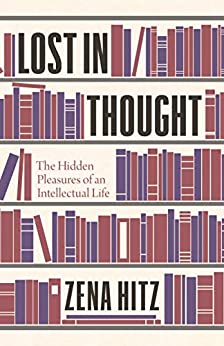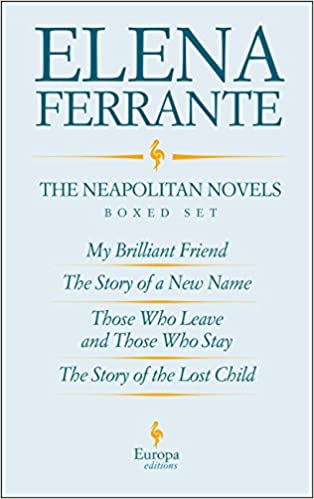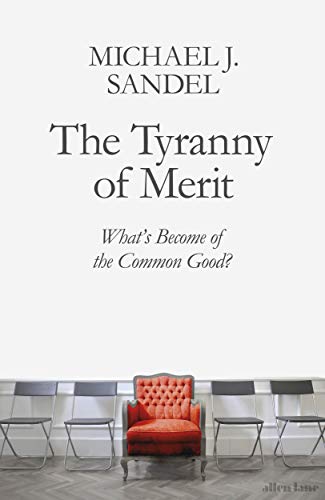Thinking about Thinking
Eric O. SpringstedZena Hitz, Lost in Thought: The Hidden Pleasures of Intellectual Life. Princeton: Princeton University Press, 2020, 226 pp.
The subtitle of this important book is misleading; one suspects it is an example of the fact that book titles are considered by presses to fall under marketing, and not authorial content. I note this because this book is about a lot more than the pleasures of intellectual life, which makes intellectual life sound like the gravy on the roast, giving pleasures that enhance or offset (sort of) the large amounts of money one have spent on higher education, and the drudgery needed to accomplish the money-making climb into economic usefulness.

What Zena Hitz (Ph.D. Princeton University,) a tutor at the intellectually serious and educationally distinctive St. John’s College, argues is something a lot deeper. It is about why a properly functioning intellectual life is essential to having a good life at all. She does so with an eye that is sensitive to many of the issues that render it difficult to argue that sort of thing on the basis of a common human nature, or divine destiny, such as thinkers such as Aristotle or Thomas Aquinas might have assumed.
Two Categories of Books

Books on the importance of intellectual life are not actually all that common. One gets, of course, exhortations to the value of intellectual life at freshman orientation at good, and aspiring liberal arts colleges and universities. One gets it in their alumni magazines, assuring donors that the school is doing just fine on its mission and holding the line. But actual books fall into just a few categories. One sees a number of them in Christian circles. That is with good reason. Christianity has been part of Western intellectual life for two thousand years, and it has seen and had to grapple with the changes in how the intellect is viewed and how it functions. If human beings are in the image of God, and God has intellectual qualities, and intellect is part of loving and knowing God, then that is important, too. And fundamentalism needs to be responded to as well. Thus, we have books such as Jean Leclercq’sThe Love of Learning and the Desire for God: A Study of Monastic Culture, A.G. Sertillanges’s The Intellectual Life: Its Spirit, Conditions, Methods, a number of Josef Pieper’s books, and recently Paul J. Griffiths’s Intellectual Appetite: A Theological Grammar.

Otherwise, such books tend to appear in conservative circles, usually decrying the sad estate of American education. One thinks of Allan Bloom’s The Closing of the American Mind: How Higher Education Has Failed Democracy and Impoverished the Souls of Today’s Students, and sections of Rod Dreher’s The Benedict Option: A Strategy for Christians in a Post-Christian Nation.
Although I think Hitz would be comfortable in explicitly contributing to the first sort of literature on the intellectual life, and probably is liked by adherents of the second, she carefully casts a broader net than just the Christian tradition and seeks ways to make this a universal issue, putting the question to those who may not share with her the same philosophical and theological ground.
A Larger Community
Hitz begins with an autobiographical prologue, outlining her own odyssey. As she traveled from St. John’s College, where assumptions that books mattered for life reigned, to graduate school where she found new success, she realized that “my eventual success planted the seeds for long years of gradual and crushing disillusionment with academic life.”(7) To be sure, graduate school was a heady experience, bringing a maturity and sophistication to the initial enthusiasm of her undergraduate years. But there was also another side to it – learning the competitiveness, and especially the academic put down, “ a ritual act of humiliation that usually takes place in public.” (9)
A generation earlier, having myself graduated from the same college, and having done half of my own doctoral seminar work in the same department, and probably the same seminar rooms as she did, it is clear to me that nothing had changed. But something did change for her. In a moment of moral awakening after the shock administered on September 11, 2001, Hitz began to realize that she belonged to a larger community than just that of scholars. In doing so, intellectual life began to look different: “Intellectual activity nurtures an inner life, a human core that is a refuge from suffering as it is a resource for reflection for its own sake.” (23)
The World of Learning is a Refuge
So the stage is set for her argument of trying to show how learning is good for its own sake. She wants to show its intrinsic value, that it does not just have its value as leverage for another, non-intellectual kind of life. It is, for her, in some way, an inward space that is the culmination and resting place of all our endeavors. It is what other things, including work, are for with respect to the human good. In this, her account is not only about the intellectual life but is also about what an inner life is.
Her argument over the course of the next three chapters is clear and direct. The world of learning is a refuge, but not a hiding place, from the world of ambition, violence, and suffering. It is at this point that an older way of approaching the issue might invoke a natural tendency of the mind to reach for some determinate state or object. Hitz resists the temptation to determine that goal and allows that one may well be agnostic on the issue of there being something determinate. But through a constant stream of examples, ones from the sorts of choices that we all have to make in daily life, and ones that have come through a clear sense of how to read a good book, she gives us a sense of a mind reaching for meaning, of all minds reaching for some kind of meaning. What does this give us if we develop intellectual life in this way? A sense of dignity, for it is a sense of being fulfilled and having a sense of one’s own mind, as well as a “capacity for knowledge and understanding, for chipping away obstacles to the truth, for contemplating what is beautiful or admirable, even for being aware of the bare fact of our own mortality and fragility” (101). And that also gives us a real connection to others. Glossing Augustine: “[W]e learn in order to love.”
On Learning: Its Values & When it is Corrupted
But why, if the intellect is geared for our reaching such humanly desirable ends, do we fail at it so miserably and so often? In good part, it is because of our fantasies, desires, and ambitions which compete with genuine learning. In her second chapter, Hitz investigates where and how learning is corrupted. One of the reasons is because of money. Certainly, money can give one the leisure for intellectual pursuits. The development of the mind cannot be neatly separated from the life of the body. But money can very easily become our chief end. Money and what it represents are capable of turning everything else to its ends, including the intellect. Intellectual life, so co-opted, can easily become one more form of fierce competitiveness, as is all too easily evident in a lot of the academic world. A second corrupting factor is what in Latin is called curiositas, which Hitz, citing Augustine, defines as a “love of spectacle.” (Paul Griffiths discusses it as a desire to own, control, and manipulate. The two definitions are not necessarily at odds with each other.) The love of spectacle replaces the joy of knowing with a delight in the feeling of knowing, or even the desire to be seen as knowing. Or, one might, citing the Sermon on the Mount, talk about it as the desire of the left hand to always know what the right hand is doing.

Both corruptions have remedies, but they take work. In the case of the first, again citing Augustine, Hitz suggests that self-examination, as philosophy once tried to do, is crucial to learning the truth about ourselves. In the case of the second corrupting factor, in an insightful discussion of Elena Ferante’s Neapolitan Novels, Hitz shows how the creativity of art can help remedy superficiality and the mere desire to appear as knowing. Seriosus is the opposite of curiositas.
The third chapter then seeks to defend the intrinsic values of learning for its own sake from the charge of uselessness. Although she does not cite him, one would do well to keep in mind here Richard Hofstadter’s still relevant Anti-Intellectualism in American Life (1962). Hofstadter pointed out there how the charge of uselessness has bedeviled American attempts at intellectual culture since our very beginning. We have always liked “smart,” he noted, as long as it produced something. This seems to include, as a consequence, a meritocracy. Not so “intellectual.” But if you can make the mind produce something – and that is the point of think tanks and any number of business schools and professional schools with their knowledgeable elites – then there is room for learning.

Hitz sees all of that as one more corrupting factor for intellectual life and learning. She even goes so far as to suggest, striking at the heart of one of our most treasured cliches, that “making a difference” is not particularly important to learning, as it gives just a pre-set agenda to learning. It, too, can be corrupting while parading as useful. This can be quite superficial, and stultifying to the freedom of mind that results in genuine learning. It is quite different than having an intellectual life that is ordered to personal service which is where the inner life ought to take us in the first place. The one is ideology, the other is a matter of having an inner life. It is in this vein that Hitz bluntly takes on the corruption of learning by politics and political goals. She comes close to writing a manifesto here in suggesting that institutions of higher learning now have little to do with real learning and teaching. What they are doing is teaching opinions and that is all. She even goes so far as to suggest that they ought always to keep politics out of the classroom. That is a show stopper, and surely a thought that is controversial in a way that this book seems to have wished to avoid.
Interpersonal Learning
If one pays attention to it and understands what Hitz thinks has gone wrong here, one can see the depths she is trying to achieve as well as the seriousness of her purpose. It is, indeed, one that goes well beyond “the pleasures of an intellectual life.” But this is not to put her on the side of the crabby conservatism of a Bloom or Dreher. What she thinks needs to happen in our colleges and universities is a type of learning that is interpersonal, an engagement of ideas between living, talking people.
It is a matter of learning to articulate one’s own thinking clearly, to see critically into one’s own mind, while taking in, which is more than just “respecting,” the thought-out ideas of others. That is not how the world outside the academy goes, to be sure. But one reason it doesn’t is because we don’t teach like this and because we keep trying to use the intellect as a mercenary in the battle of ideologies. Thus, she calls for a return to a different kind of teaching, which can help restore one’s humanity, a kind of teaching “that consists in the person-to-person transmission of habits of mind that underlie all serious thinking, reflection, and discovery” (199).
Hitz is clear-sighted about the problems that intellectual life faces, and wonderfully sanguine about what it offers – if we pay attention to what intellectual life is good for, and what it can offer the human being. Let me add one more aspect of her argument here, that might too easily be overlooked but shouldn’t be, namely how she deals with the specter of elitism. After all, who but the intellectual elite, mainly academics, worries about the intrinsic value of the intellectual life? Moreover, hasn’t emphasis on intellectual achievement produced the meritocracy that offers education to all, and exhorts all to take advantage of it, done so in the name of improving oneself and one’s lot in life? But hasn’t that actually produced a highly competitive system of winners and losers that is weighted towards the privileged?

Recently, Michael Sandel has issued some very difficult challenges on just this score in his The Tyranny of Merit: What’s become of the Common Good?. Hitz is aware of this sort of challenge. Citing Simone Weil, she works to take it into consideration in her treating the value of the intrinsic life. Weil had pointed out the need “to distinguish, among the attempts at working-class culture, those that are conducted in such a way as to strengthen the ascendancy of the intellectuals over the workers, and those conducted in such a way as to free the workers from this domination” (45). If the intellectual life is good for all, then intellectuals can’t turn it into something that keeps them in the driver’s seat.
On Dignity
Hitz keeps her eye on this problem as she unfolds the value of intellectual life. For example, the idea that learning increases dignity and a sense of self-worth is explicitly raised to treat this issue. One does not have real dignity because one graduated from a highly respected school. One has it because of what one knows, how one knows it, and how one uses that knowledge. That may seem simple enough but given the absolutely immense role that money and prestige play in learning, it is even easier to see why money and prestige can be so corrupting. It is not just that they distract and tempt one; they can absolutely destroy any real sense of one’s worth, and force one to bow down before the mind-eating idol. We like to advertise education and learning as the keys to having a good life. Given what we honor as a good life, it is a very difficult thing to see how education can be that, except in a way that utterly betrays the life of the mind. Hitz has done a wonderful job of drawing our attention to just what the issues are, and, if we actually would dare, to see where the direction of a solution lies.
Eric O. Springsted is the co-founder of the American Weil Society and served as its president for thirty-three years. After a career as a teacher, scholar, and pastor, he is retired and lives in Santa Fe, NM. He is the author and editor of thirteen books, including Simone Weil: Late Philosophical Writings (University of Notre Dame Press, 2015) and the just-released Simone Weil for the Twenty-First Century (University of Notre Dame Press, 2021). He is also on Attention’s advisory board.7 Recommendations

